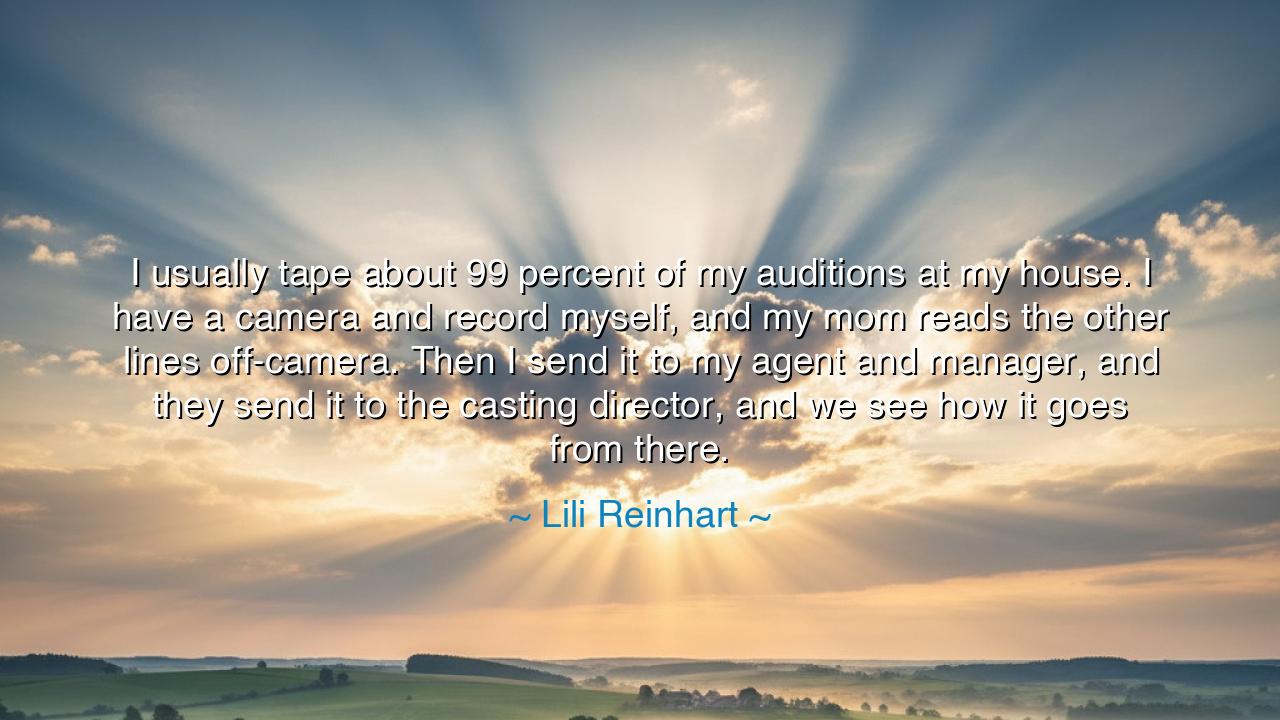
I usually tape about 99 percent of my auditions at my house. I
I usually tape about 99 percent of my auditions at my house. I have a camera and record myself, and my mom reads the other lines off-camera. Then I send it to my agent and manager, and they send it to the casting director, and we see how it goes from there.






There is quiet devotion and steadfast humility in the words of Lili Reinhart, who said, “I usually tape about 99 percent of my auditions at my house. I have a camera and record myself, and my mom reads the other lines off-camera. Then I send it to my agent and manager, and they send it to the casting director, and we see how it goes from there.” In this simple description of her process lies a profound reflection on discipline, perseverance, and the sacred bond between parent and child. It is a reminder that behind every triumph we see in the light stands the quiet labor of unseen days — the work done in solitude, with love as its witness.
The origin of this quote is not found in glamour or red carpets, but in the quiet, uncelebrated corners of daily striving. Before fame and recognition, Reinhart — like many artists — built her path in the intimacy of home, where ambition met patience and practice. The presence of her mother, reading lines from behind the camera, adds a tenderness that elevates this story beyond career talk. It is not merely about auditions or craft; it is about the shared pursuit of a dream, where love becomes both foundation and companion. This quote, then, captures the essence of humble beginnings: the truth that greatness often grows not from spectacle, but from the simple act of showing up — again and again — with faith and persistence.
In the traditions of the ancients, such devotion would be seen as a form of discipline of the spirit. The Greek philosophers spoke of areté — the excellence that is born of repetition and purpose. For them, mastery was not granted by fortune, but forged by habit. Each taped audition, each unseen effort, becomes a brick in the unseen temple of destiny. Reinhart’s process mirrors this timeless truth: she does not wait for the perfect moment or grand stage. She creates, she refines, she endures. And in the small space of her home, she builds the foundation of her future — quietly, faithfully, like an artist chiseling marble long before the statue is revealed.
The role of her mother in this story evokes something even older and deeper — the ancient partnership between generations. Just as blacksmiths once taught their children to shape iron, and poets once taught their pupils to shape words, so too does this mother lend her voice and presence to shape her daughter’s art. Her reading of the “other lines off-camera” is more than a technical aid; it is a spiritual act, a way of saying, “I am with you.” Through this partnership, we glimpse the timeless truth that success is rarely solitary. Behind every artist, there is often a parent, mentor, or friend who believed long before the world did.
History is filled with such stories. Think of Michelangelo, whose genius was born in the workshops of Florence, guided by mentors who taught him not only the mechanics of art but the reverence for labor. Or Ludwig van Beethoven, who spent endless hours in dimly lit rooms, practicing until his fingers bled, guided by the memory of a father’s harsh lessons. The pattern repeats across centuries: greatness grows in private toil. Reinhart’s taping process — mundane as it may seem — stands in this same lineage of persistence. It is the ritual of the devoted: to labor in silence, to prepare unseen, and to trust that the light will come in its own time.
Her words also remind us of the beauty of simplicity. In an age obsessed with instant recognition and spectacle, she finds meaning in the ordinary — a camera, a living room, a mother’s voice. The ancients taught that simplicity is not the absence of greatness but its beginning. The archer does not despise the repetition of the draw; the scholar does not scorn the daily reading of the same text. For it is in these repetitions that excellence is born. Likewise, the artist who records her lines at home learns that success is not a single grand act but a thousand small acts done with care and love.
The lesson, my children, is this: do not wait for the perfect stage to begin your work. Begin where you are. Create with what you have. Invite those who love you into the journey, for their belief will sustain you when your own wavers. Whether you dream of art, knowledge, or service, remember that greatness begins not in applause, but in practice. The divine reward belongs to those who are faithful in the small things, for from such faithfulness, mountains are moved.
So let Lili Reinhart’s quiet story remind you: success is not born in grand halls, but in humble rooms where courage meets patience. Every recorded line, every shared effort, every whispered encouragement becomes part of a larger harmony — one that time itself will one day recognize. For in the end, the truest art is not only what we create, but the love and perseverance that created us.






AAdministratorAdministrator
Welcome, honored guests. Please leave a comment, we will respond soon